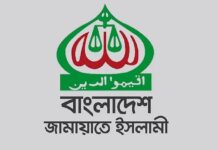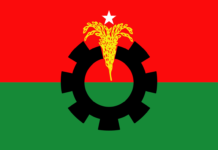Retaining her office as Prime Minister for the second consecutive term, Awami League President Sheikh Hasina on Sunday started the journey of her new government with a 49-member cabinet promising to ensure good governance.
Sheikh Hasina, the eldest daughter of Bangabandhu Sheikh Mujibur Rahman, was sworn in as Prime Minister for the second successive term as well as for the third time following her party’s ‘massive victory’ in the much-talked-about election to the 10th parliament boycotted by BNP.
President Abdul Hamid administered oath to the Prime Minister and her cabinet members comprising 29 ministers, 17 state ministers and two deputy ministers at Bangabhaban’s Darbar Hall.
Sheikh Hasina took oath at 3.35 pm while the ministers around 3:44pm state ministers around 3:50pm and deputy ministers around 3:55pm. Cabinet secretary M Musharraf Hossain Bhuiyan conducted the programme.
Those took oath as ministers are Abul Maal Abdul Muhith, Amir Hossain Amu, Tofail Ahmed, Begum Matia Chowdhury, Abdul Latif Siddique, Syed Ashraful Islam, Rashed Khan Menon, Engineer Khandker Mosharraf Hossain, Obaidul Quader, Hasanul Haq Inu, Anisul Islam Mahmud, Shajahan Khan, Md Mujibul Hoque, Mohammad Nasim, Syed Mahsin Ali, Anwar Hossain Manju, Nurul Islam Nahid, Anisul Haque, Mofazzel Hossain Chowdhury Maya, AHM Mostafa Kamal, Engineer Mosharraf Hossain, Mustafizur Rahman, Asaduzzaman Noor, Shamsur Rahman Sharif, Quamrul Islam, AKM Mojammel Haque, Saidul Haque, Matiur Rahman and Imajddin Pramanik.
The state ministers who were sworn in are Md Mujibul Haque (Chunnu), Yeafes Osman, MA Mannan, Mirza Azam, Promode Msankin, Bir Bahadur, Asaduzzaman Khan, Saifuzzaman Chowdhury Javed, Ismat Ara Sadek, Mashiur Rahman Ranga, Meher Afroj Chumki, Shahriar Alam, Jahid Malek, Naryan Chandra Chanda, Biren Sikder, Nasrul Hamid Bipu and Junaed Ahmed Palak.
Besides, Abdullah Al Islam Jacob and Arif Khan Joy took oath as deputy ministers.
Hours after the oath-taking ceremony, the Prime Minister distributed portfolios among her Cabinet members.
Nearly three dozens of influential ministers and state ministers of the past government fell from the grace of Prime Minister Sheikh Hasina as they failed to win her heart to retain their positions.
Former Home Minister Dr Muhiuddin Khan Alamgir, Foreign Minister Dr Dipu Moni, Environment and Forests minister Dr Hasan Mahmud, Law Minister Barrister Shafique Ahmed, minister without portfolio Suranjit Sengupta, Food Minister Dr Abdur Razzaque, Industries Minister Dilip Barua, Health Minister AFM Ruhal Haque, Labour Minister Raziuddin Ahmad Raju, Post and Telecommunications Minister Shahara Khatun, Commerce Minister GM Quader, and ex-state ministers Shamsul Hoque Tuku, Jahangir Kabir Nanak, Abdul Mannan Khan, Capt (retd) AB Tajul Islam and Ahad Ali Sarkar among the former cabinet members who failed to win Hasina’s blessings to be ministers or junior ministers again.
The dignitaries at the function included the Speaker, the Chief Justice, civil and military bureaucrats, judges, diplomats, newly elected lawmakers, heads of diplomatic missions, leaders of different political parties and eminent citizens.
The BNP chairperson and immediate past opposition leader Khaleda Zia did not turn up at the programme though she was invited.
More than 1000 guests, including foreign diplomats, were invited to attend the function.
Most of the guests, including Jatiya Party chairman and ex-president HM Ershad, his wife and leader of the opposition in parliament Raushan Ershad and foreign diplomats stationed in Dhaka, Sheikh Hasina’s son Sajeeb Wazed Joy and her sister Sheikh Rehana, joined the oath-taking ceremony.
On January 5, the voting was held in 147 constituencies as the candidates for remaining 153 constituencies were elected unopposed in the 10th parliamentary elections, which was boycotted by the main opposition BNP.
A total of 292 candidates have been elected in the election.
Of the 292 constituencies, ruling Awami League won 232, while HM Ershad-led Jatiya Party 33, Workers Party six, Jasad five, Jatiya Party-JP, Tarikat Federation and BNF one each and independent candidates 13 seats.
On January 8, the Election Commission published the results of 290 constituencies of the elections through a gazette notification.
On January 9, President Abdul Hamid invited Awami League President Sheikh Hasina to form government as Awami League Parliamentary Party (ALPP) picked her as the leader of the House at a meeting after the new MPs were sworn on the same day.
Hasina became Prime Minister for the third time equating her arch rival Khaleda Zia.
Awami League chief Sheikh Hasina formed her last government on January 6, 2009 following the landslide victory of her party in the ninth parliamentary polls held on December 29, 2008.
Sheikh Hasina first became the Prime Minister of Bangladesh on June 23, 1996 after the seven parliamentary elections.
Source: UNBConnect










